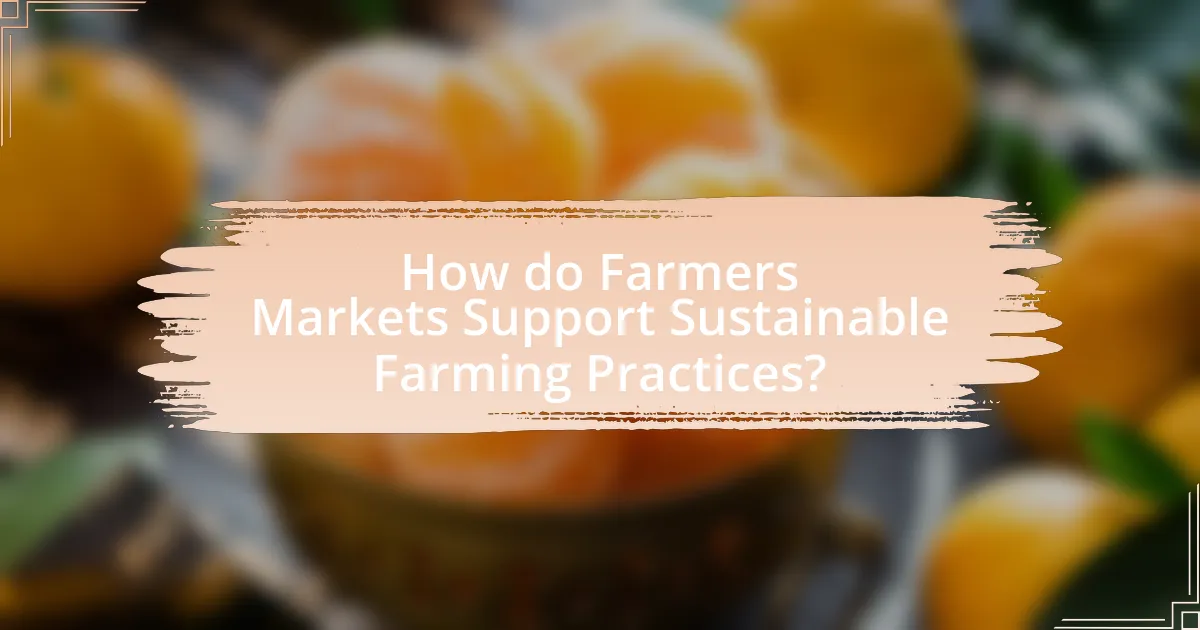Farmers markets play a crucial role in promoting sustainable farming practices by providing a direct sales platform for local farmers, which reduces transportation emissions and encourages environmentally friendly methods. They support key principles of sustainable agriculture, such as local sourcing, organic practices, and biodiversity, while also enhancing the economic viability of small-scale farmers. Additionally, farmers markets educate consumers about sustainability, foster relationships between producers and consumers, and face challenges such as regulatory barriers and competition from larger retailers. By implementing strategies to enhance sustainability and community support, farmers markets can significantly contribute to local economies and promote environmentally responsible agricultural practices.

How do Farmers Markets Support Sustainable Farming Practices?
Farmers markets support sustainable farming practices by providing a direct sales platform for local farmers, which reduces transportation emissions and encourages environmentally friendly farming methods. By connecting consumers with local producers, farmers markets promote the sale of organic and sustainably grown products, which often adhere to practices that enhance soil health and biodiversity. Research indicates that local food systems, such as those facilitated by farmers markets, can lead to a 25% reduction in carbon emissions associated with food transport. Additionally, farmers markets often require vendors to follow sustainable practices, further reinforcing the commitment to environmental stewardship within the agricultural community.
What are the key principles of sustainable farming promoted by farmers markets?
Farmers markets promote key principles of sustainable farming, including local sourcing, organic practices, biodiversity, and reduced environmental impact. Local sourcing emphasizes the importance of purchasing food from nearby producers, which supports local economies and reduces transportation emissions. Organic practices focus on avoiding synthetic fertilizers and pesticides, thereby enhancing soil health and promoting ecological balance. Biodiversity is encouraged through the cultivation of a variety of crops, which helps to maintain resilient ecosystems. Additionally, sustainable farming at farmers markets often involves practices that minimize waste and conserve water, contributing to overall environmental sustainability. These principles are supported by research indicating that local food systems can significantly lower carbon footprints and enhance community health.
How do farmers markets encourage organic farming methods?
Farmers markets encourage organic farming methods by providing a direct sales platform for organic farmers, which enhances their economic viability. This direct-to-consumer model allows organic farmers to receive higher prices for their products compared to traditional retail channels, incentivizing them to adopt and maintain organic practices. According to a study by the USDA, farmers markets have seen a significant increase in organic produce sales, with organic farmers reporting a 30% higher income from direct sales at these markets compared to wholesale. This financial benefit motivates more farmers to transition to organic methods, thereby promoting sustainable agricultural practices.
What role do local food systems play in sustainable agriculture?
Local food systems are essential to sustainable agriculture as they enhance food security, reduce environmental impact, and support local economies. By connecting consumers directly with local producers, these systems minimize transportation emissions and promote the consumption of seasonal, fresh produce, which is often grown using sustainable practices. Research indicates that local food systems can lead to a 25% reduction in greenhouse gas emissions compared to conventional food supply chains. Additionally, they foster biodiversity by encouraging diverse crop production and preserving traditional farming methods. This integration of local food systems into agriculture not only strengthens community ties but also contributes to the resilience of food systems in the face of climate change.
Why are farmers markets important for local economies?
Farmers markets are important for local economies because they stimulate economic activity by providing a direct sales platform for local farmers and artisans. These markets enable farmers to sell their products directly to consumers, which often results in higher profit margins compared to wholesale distribution. According to a study by the USDA, farmers markets can generate up to 50% more income for farmers than traditional retail channels. Additionally, they create jobs and support local businesses, as vendors often purchase supplies and services from nearby establishments. This localized economic interaction fosters community engagement and strengthens the local food system, contributing to overall economic resilience.
How do farmers markets help small-scale farmers thrive?
Farmers markets help small-scale farmers thrive by providing direct access to consumers, which allows them to sell their products at higher prices compared to wholesale markets. This direct-to-consumer model eliminates intermediaries, enabling farmers to retain a larger share of the profits. According to a study by the USDA, farmers markets can increase farmers’ income by up to 40% compared to traditional sales channels. Additionally, these markets foster community connections and consumer loyalty, encouraging local support for sustainable farming practices. This relationship not only enhances the economic viability of small-scale farmers but also promotes the consumption of locally grown, fresh produce, contributing to overall community health and sustainability.
What economic benefits do farmers markets provide to communities?
Farmers markets provide significant economic benefits to communities by stimulating local economies and supporting small-scale farmers. They create direct sales opportunities for farmers, allowing them to retain a larger share of the profits compared to traditional retail channels. According to a study by the USDA, farmers markets can generate up to 50% more income for farmers than selling through wholesale distributors. Additionally, these markets encourage local spending, as consumers are more likely to purchase from nearby vendors, which keeps money circulating within the community. Research from the Farmers Market Coalition indicates that for every dollar spent at a farmers market, approximately $0.76 stays in the local economy, enhancing community resilience and economic stability.

In what ways do Farmers Markets Educate Consumers about Sustainability?
Farmers markets educate consumers about sustainability primarily through direct engagement with local farmers and the promotion of sustainable agricultural practices. By providing a platform for farmers to share their methods, consumers learn about organic farming, crop rotation, and the importance of biodiversity. Additionally, farmers markets often host workshops and informational sessions that cover topics such as composting, seasonal eating, and the environmental impact of food choices. Research indicates that consumers who shop at farmers markets are more likely to adopt sustainable practices in their own lives, as they gain firsthand knowledge about the food system and its ecological implications. This educational aspect is reinforced by the transparency of sourcing, allowing consumers to understand the journey of their food from farm to table.
How do farmers markets raise awareness about sustainable practices?
Farmers markets raise awareness about sustainable practices by providing a direct platform for local farmers to showcase their environmentally friendly methods. These markets often feature vendors who prioritize organic farming, reduced pesticide use, and sustainable resource management, allowing consumers to learn about and support these practices firsthand. Educational initiatives, such as workshops and informational signage at the markets, further enhance understanding of sustainable agriculture. Research indicates that consumers who engage with farmers markets are more likely to adopt sustainable practices in their own lives, as they gain insights into the benefits of local and sustainable food systems.
What educational programs are often found at farmers markets?
Farmers markets often feature educational programs such as cooking demonstrations, nutrition workshops, and sustainable farming practices seminars. These programs aim to inform consumers about healthy eating, food preparation techniques, and the benefits of supporting local agriculture. For instance, cooking demonstrations may showcase how to prepare seasonal produce, while nutrition workshops can provide insights into the health benefits of various fruits and vegetables. Additionally, seminars on sustainable farming practices educate attendees about environmentally friendly farming methods, promoting awareness of local food systems and their impact on sustainability.
How can consumers learn about seasonal eating at farmers markets?
Consumers can learn about seasonal eating at farmers markets by engaging directly with local farmers and vendors who provide information about the produce available during specific times of the year. Farmers often display signage indicating what is in season and can offer insights into the best ways to prepare and store seasonal items. Additionally, many farmers markets host educational workshops and cooking demonstrations that focus on seasonal ingredients, helping consumers understand the benefits of eating locally and seasonally. Research indicates that consumers who participate in these educational activities are more likely to make informed choices about their food, thus supporting sustainable farming practices.
Why is consumer engagement crucial for sustainable farming?
Consumer engagement is crucial for sustainable farming because it fosters a direct connection between consumers and producers, leading to increased demand for environmentally friendly practices. When consumers actively participate in farmers markets, they gain awareness of sustainable farming methods, which encourages them to support local farmers who prioritize ecological health. Research indicates that consumers are more likely to purchase products from farmers who engage in sustainable practices, as evidenced by a study published in the Journal of Agricultural and Environmental Ethics, which found that 70% of consumers prefer to buy from sources that demonstrate commitment to sustainability. This engagement not only drives sales for sustainable products but also incentivizes farmers to adopt and maintain eco-friendly practices, creating a positive feedback loop that benefits both the environment and the economy.
How do farmers markets foster relationships between consumers and farmers?
Farmers markets foster relationships between consumers and farmers by providing a direct platform for interaction and exchange. This setting allows consumers to engage with farmers, ask questions about their farming practices, and gain insights into the origins of their food. Research indicates that such interactions enhance trust and transparency, as consumers can observe the quality of products and the methods used in cultivation. A study by the USDA found that 85% of consumers at farmers markets reported feeling more connected to the local food system, which reinforces the bond between them and the farmers. This direct engagement not only supports local economies but also encourages sustainable farming practices, as consumers often express a preference for environmentally friendly methods when purchasing directly from farmers.
What impact does consumer choice have on sustainable farming practices?
Consumer choice significantly influences sustainable farming practices by driving demand for environmentally friendly products. When consumers prioritize organic, locally sourced, and sustainably produced food, farmers are incentivized to adopt practices that align with these preferences. For instance, a study by the USDA found that farmers markets, which cater to consumer demand for sustainable options, have increased the number of farms practicing sustainable agriculture by 20% over the past decade. This shift not only supports local economies but also encourages farmers to implement practices that reduce chemical use, enhance biodiversity, and improve soil health. Thus, consumer choices directly shape the agricultural landscape towards sustainability.

What Challenges do Farmers Markets Face in Promoting Sustainability?
Farmers markets face several challenges in promoting sustainability, primarily including limited access to resources, competition from larger retailers, and consumer awareness. Limited access to resources, such as funding and infrastructure, restricts farmers’ ability to implement sustainable practices effectively. Competition from larger retailers often leads to lower prices for conventional products, making it difficult for farmers markets to attract customers who prioritize sustainability. Additionally, consumer awareness about the benefits of sustainable farming practices is often low, which hinders the market’s ability to educate and engage the public. These challenges collectively impact the effectiveness of farmers markets in promoting sustainable agriculture.
What barriers exist for farmers markets in supporting sustainable practices?
Farmers markets face several barriers in supporting sustainable practices, primarily including limited access to resources, regulatory challenges, and consumer demand fluctuations. Limited access to resources such as funding, training, and infrastructure hampers farmers’ ability to adopt sustainable methods. Regulatory challenges, including zoning laws and health regulations, can restrict the types of products that can be sold or the practices that can be implemented. Additionally, fluctuations in consumer demand for sustainable products can make it difficult for farmers markets to maintain a consistent supply of sustainably produced goods, impacting their overall viability and commitment to sustainability.
How do regulations affect the operation of farmers markets?
Regulations significantly influence the operation of farmers markets by establishing guidelines for food safety, vendor licensing, and product standards. These regulations ensure that vendors comply with health codes, which can enhance consumer trust and safety. For instance, the USDA’s Farmers Market Promotion Program provides funding and resources to help markets meet these regulatory requirements, thereby promoting sustainable practices. Additionally, local zoning laws may dictate where farmers markets can operate, affecting their accessibility and overall success. Compliance with these regulations can also lead to increased market legitimacy, attracting more customers and supporting local economies.
What challenges do farmers face in accessing farmers markets?
Farmers face several challenges in accessing farmers markets, including high fees, regulatory barriers, and logistical issues. High fees can include market stall rental costs and additional expenses for permits, which can deter small-scale farmers from participating. Regulatory barriers often involve complex health and safety regulations that vary by location, making compliance difficult for farmers. Logistical issues, such as transportation difficulties and the need for proper storage facilities, further complicate access to these markets. According to a study by the USDA, approximately 30% of small farmers cite these barriers as significant obstacles to their market participation.
How can farmers markets overcome these challenges?
Farmers markets can overcome challenges by implementing effective marketing strategies and enhancing community engagement. By utilizing social media and local advertising, farmers markets can increase visibility and attract more customers, which is essential for their sustainability. Research indicates that markets with strong community ties and active promotion see a 20% increase in foot traffic compared to those that do not engage in marketing efforts. Additionally, fostering partnerships with local organizations can provide resources and support, helping to address logistical issues such as transportation and access to fresh produce. These strategies not only improve market viability but also promote sustainable farming practices by connecting consumers directly with local farmers.
What strategies can be implemented to enhance sustainability at farmers markets?
Implementing strategies such as promoting local produce, reducing plastic use, and encouraging organic farming can significantly enhance sustainability at farmers markets. By prioritizing local produce, markets reduce transportation emissions and support local economies, as evidenced by a study from the USDA which found that local food systems can lower carbon footprints. Reducing plastic use through initiatives like reusable bags and containers minimizes waste, aligning with findings from the Environmental Protection Agency that highlight the detrimental impact of plastic pollution. Additionally, encouraging organic farming practices not only improves soil health but also reduces chemical runoff, supported by research from the Rodale Institute showing that organic farming can sequester carbon and enhance biodiversity.
How can community support strengthen farmers markets?
Community support can strengthen farmers markets by increasing customer loyalty and enhancing local economic resilience. When community members actively participate in farmers markets, they create a consistent customer base that encourages farmers to invest in sustainable practices. Research indicates that farmers markets with strong community backing see a 20% increase in sales, which directly benefits local farmers and promotes sustainable farming methods. Additionally, community engagement fosters a sense of ownership and pride, leading to increased volunteerism and support for local initiatives that further enhance the market’s sustainability efforts.
What are some best practices for consumers to support sustainable farming at farmers markets?
Consumers can support sustainable farming at farmers markets by prioritizing purchases from local, organic farmers who practice environmentally friendly methods. This choice directly contributes to reducing carbon footprints associated with food transportation and supports biodiversity through organic farming practices. Additionally, consumers should engage with farmers to inquire about their farming practices, ensuring they understand the sustainability measures in place. Research indicates that local food systems can reduce greenhouse gas emissions by up to 25% compared to conventional food systems. Lastly, consumers can advocate for and participate in community-supported agriculture (CSA) programs, which provide farmers with upfront capital and promote sustainable practices.